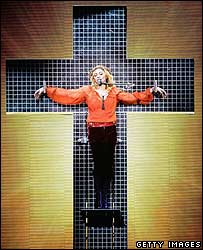Text: John 8:31-36/Psalm 46
Free at Last
Grace, mercy, and peace to you from God our Father, and from our Lord and Savior, Jesus Christ, amen. The text for the sermon this morning comes from the Gospel and Psalm 46 which were read earlier.
In one of his earliest Reformation writings, Martin Luther wrote On the Freedom of a Christian Man. The Reformation was about the question “What does it mean for man to be free?” In our culture and society, freedom is usually associated with choice; a person is free who has the right and power to choose as he wills. We often hear of the freedom of choice. However, such freedom arises from the idea that man is free by way of detachment from persons and things; such freedom arises from the idea of the person as independent and autonomous. The Bible knows of no such freedom of man. The Bible rather reveals man as entrapped, dead in sin, and destined to death. That man can live only if he is freed from that slavery and is reborn to the servanthood of love.
The date is October 31, 1517. A young professor at Wittenberg is struggling with his faith. He has the faith which he has been taught by the Roman Catholic Church, yet he has the faith of his own heart and conscience which says that there is something wrong with the Roman Catholic Church. That is when this young monk decided to do something. He wrote up a document for discussion and nailed it to the town bulletin board, the door of the Castle Church in Wittenberg. That document, known as the 95 Theses, led Luther and many others to freedom.
In our Gospel reading for this morning, Jesus tells “the Jews who had believed him” what is needed to be set free: “If you hold to my teaching, you are really my disciples. Then you will know the truth, and the truth will set you free.” For Martin Luther, he wanted to be free: free from the false errors that were being taught by the Roman Catholic Church. He criticized what was unbiblical, but at the time, he had no intention of splitting the Church. His goal was to reform the Church, to correct the abuses and make straight what had gone crooked over the past few centuries. At least, that’s how it began.
Luther looked at the teachings of the Roman Catholic Church and found flaws in them because they are teachings of man. He was a learned man with regards to the Scriptures and saw nothing in there about the practice of indulgences. Indulgences, as you may know, were the documents purchased from the Church that would take away the punishments for sin people thought they had to suffer after death in a place called purgatory.
In the following years, Luther saw that the problems ran much deeper than just indulgences. The problems dealt with the liturgy, they dealt with leadership in the Church, and, even more central, they dealt with the certainty of salvation. They dealt essentially with these two questions: “Who rules the Church?” and “How can I find a gracious God?” That is, the questions were about God’s Word and God’s grace. Luther’s goal was to return authority in the Church to the Word of God. His goal was to return to the Word of God and find therein the grace of God.
That was and still is the heart of the Reformation. It wasn’t about starting a new church. It was about going back to the Word of God. Only in the teachings of Christ will we know the truth and be set free.
If John’s account would have stopped there, all would have been well, but it didn’t stop there. “They answered him, ‘We are Abraham’s descendants and have never been slaves of anyone. How can you say that we shall be set free?’”
They looked at what Jesus had said only in an earthly manner; they failed to look at it in a spiritual manner. They knew the one true God. They had the truth. They were heirs of the covenant of Abraham. They were free. So if you are free already, how can you be free again?
We look at Jesus’ words in a worldly manner also. We are not slaves to anyone so how can we be set free? We are slaves and we are not free. As Jesus said, “I tell you the truth, everyone who sins is a slave to sin.” We are slaves. We are slaves because we are sinful. We are slaves because of the sinful world that we live in. We are slaves and there is nothing that we can do about it. The Bible shows that once a person sins, he is no longer free to serve God, only sin. In fact, he is now compelled to sin, because sin is personified as a harsh, domineering master that has a stranglehold on us. Every sin only serves to bind us tighter in its lock. And once we are slaves to sin, we cannot free ourselves.
Jesus Christ has indeed set us free. If the Son frees us, we are really free; free from the compulsion and bondage of sin, free to serve God as He originally intended us to do and as Jesus did.
Martin Luther, the great reformer, relied solely upon Jesus Christ and His teaching to free us, not the false teachings and practices of the Roman Catholic Church. In looking at Scripture, He saw that outside practices, while they may be good, do not bring about salvation. Salvation has been won for us by Jesus Christ on the cross. Where did Luther get this? He got it from Scripture, namely Psalm 46, which is the basis for his hymn, “A Mighty Fortress Is Our God.” “God is our refuge and strength, an ever-present help in trouble.”
For Luther, this is what he needed to hear. He entered the monastery because he thought by doing this, he would be able to escape the world and its sin. Unfortunately, he discovered that even in the monastery, sin was still present. There was nowhere that he could go to where sin would not be present. But when Luther read Psalm 46, he was put to ease. It didn’t matter what happened, God would be the ever-present help in trouble. “A mighty fortress is our God,/A trusty shield and weapon;/He helps us free from ev’ry need/That hath us now o’er-taken.” Where did Luther find the trusty shield and weapon? He found it in Jesus Christ and Him alone: “But for us fights the valiant One,/Whom God Himself elected./Ask ye, Who is this?/Jesus Christ it is,/Of Sabaoth Lord,/And there’s none other God.”
Salvation is found only in Jesus Christ. He knew from what Scripture taught that one could not find salvation in an indulgence. He knew from what Scripture taught that one could not find salvation by praying “Hail Mary’s” and “Our Father’s.” Salvation has been won for us by Jesus Christ on the cross. There and only there can be forgiven. It was here that Luther found freedom at last: freedom from sin, death, and the devil. Salvation came by faith, not by what we did, but by the grace of God. By grace alone, by faith alone, and by Scripture alone are we free at last. In the name of Jesus, amen.
Now the peace of God, which passes all understanding, keep your hearts and minds through faith in Christ Jesus until life everlasting. Amen.
Powered by Qumana

